| Software Scene |
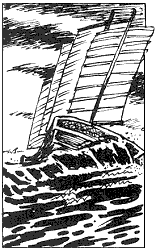
LIFE on the China Seas can be exciting, so long as you do not owe money to the moneylender in this game for the ZX-81. Taipan appeared originally as a program in Sinclair User but now the author has decided to retail it.
The object is to sail round the ports of Hongkong, Singapore, Macao, Bangkok and. Shanghai, to earn money from the sale of goods to the populace. Some of the cargos you will carry are strange and exotic, including general goods, arms, silk, opium and even women.
The game takes account of three ranks of trader - beginner, experienced trader and financial wizard. We do not know of anyone who has reached the financial wizard stage without owing plenty of money to the wicked Chinese moneylender, Sum Yan. One of the troubles of being a trader is that Sum Yan may send some of his 'boys' to beat the money out of you.
When the buying and selling has finished at one port it is possible to go to another using the Quit command. The prices of goods there may be higher than at the port you have left and you may make plenty of money.
As you travel from one port to another the interest on the money owed to Sum Yan increases, so it is a good idea to return to your home base of Hongkong and pay back some of it.
The promise of money and power in China proved false for us because we were never out of debt. That ensured that the game attracted some new addicts.
Taipan is available from Jaysoft, Herts. It costs £4.95.
FROGGER is an arcade game which has caused a good deal of interest among Sinclair users and the software industry in general. The attitude seems to be that if you are a big software house you must have a version of this amphibious game.
The version produced by DJL Software for the 16K ZX-81 is a good example. The frog hops across the road and then across the river to the safety of the home enclosure. When the last jump is made a large smiling frog plops into view on the far side of the river.
The dangers facing the frogs and their offspring include the cars on the road and the logs, turtles, diving turtles and alligators of the river.
There are five frog homes to fill but a player can score points just by moving a frog forward. You have three to move and if one is hit by a car or drowned you lose a frog. If, however, you manage to get one home safely you will get an extra hopper. If, by some miracle, you get 5,000 points, you will be given an extra life.
Frogger is very addictive and the membrane keyboard in no way hampers play. The program can be obtained from DJL Software, Wilts. It costs £5.95.
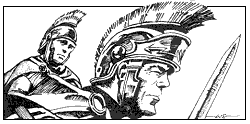
SIMULATION of ancient wars between old-world empires has become a speciality of the software house M C Lothlorien. Roman Empire, for the 16K Spectrum and ZX-81, is the new Lothlorien product. The game is set in the first century BC. As Emperor of Rome you have to conquer six hostile countries. Those countries are regarded as hostile because you do not rule over them.
At the beginning of the game you are given five generals, each with an army under his command. The armies are your ticket to absolute power. As well as the five armies you also have 10 legions, each comprising 5,000 soldiers. From those legions you can stock your armies in such a way as to make sure you will be the conqueror. The way in which you distribute the legions is an important factor in winning the game.
There are three levels of play, ranging from difficult to impossible. We have managed to keep our power-base only in the first two levels. When you have entered the level of difficulty you must build your armies and send them against the countries of your choice.
Matching armies is a skill which is not acquired easily. If you put the wrong army into an area which contains an enemy army of greater strength you will be eliminated. Roman Empire costs £5.50 for the Spectrum and £4.50 for the 16K ZX-81 from M C Lothlorien, Cheshire.
THE BLACK CRYSTAL is one of the first graphic adventures for the 48K Spectrum and 16K ZX-81. The plot of the adventure, which is played in six parts, is to destroy the evil Black Crystal with its malign intelligence before you are destroyed by the Lords of Chaos.
To do so you must get through six maps on which you can move your little player, using the cursor keys. On the first map you must find some rings of power to enter the castles on that map. When you find the rings you may go through the door of the Castle of Shadows or into the dark domain of Shaggoth's Lair.
You must struggle around hidden mazes, fight dragons, and avoid deadly mists. The finalconflict is between you and the Lords of Chaos. If you win you will destroy the Black Crystal and peace will reign in the land. If you fail, you and the inhabitants of the land will be doomed to eternal torment.
The Black Crystal is an excellent graphics adventure and a well-though-out package. There are two cassettes in the box and an introductory booklet giving the history of the Black Crystal, as well as instructions and hints on play.
The game has good quality graphics. The Black Crystal is available from Carnell Software, Berkshire. The package is reasonably priced at £7.50.
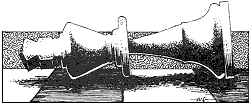
MASTER CHESS, from Mikro Gen, is one of the best chess programs available for the 48K Spectrum. The game allows the user to play at one of 10 levels, numbered from zero to nine. The computer will respond with its move almost immediately in mode zero but the computer move in mode nine can take several minutes.
If a player is stuck in a position, the computer will suggest a move. In effect, the computer will recommend to its opponent the best move to make against itself, which shows that computers have no brains. The program also allows you to set up the board before playing the rest of the game.
The board can be cleared and a flashing cursor will appear on one of the board squares. Entering the appropriate letter, for example 'p' for pawn or 'k' for king, will make the computer place that piece on the square with the cursor.
When the board is set up with all the pieces in the order the player requires, the game will continue after selection of colour and level number.
A record of the moves made is kept on the left-hand side of the screen. If the player makes an illegal move the computer will not permit it and if the player wants to make another move instead of the one last entered, that move can be deleted.
The game is capable of pawn promotion and en passant and is one of the best versions of chess for the Spectrum. Master Chess can be obtained from Mikro Gen, Berkshire. It costs £6.95.
MACHINE CODE compilers are starting to creep on to the Sinclair scene. The Softek compiler for the 48K Spectrum is called Super C. The manufacturer claims that the code compiled from Basic into machine code will run faster than many other languages, including Pascal and Forth. The program will compile approximately 90 percent of the Basic language commands.
The problem newcomers to machine code may have is how to use arrays and variables within compiled programs. The compiler cannot handle string or numeric variables or arrays.
If the user knows something about machine code the situation can be remedied by setting up a data area in memory with all the variable values set in it.
Super C has an instruction booklet which includes tips for modifying Basic programs to run without using statements which cannot be compiled. Compiled programs can be run easily by typing RUN instead of having to worry about RAND USR.
The compiler is useful in programs which use animated graphics but, until Softek produces promised modifications, the program may prove difficult to use for some beginners. The Super C compiler costs £14.95. It is available from Softek, London.
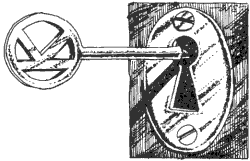
THE KRAKIT competition, launched in England by Artic Computing and in the U.S. by an American publishing firm, has generated a good deal of interest in the software business.
The program you have to buy to enter the competition is different from any other we have reviewed, because it lists only a series of riddles and allows you to store the answers which you have for them.
The ZX-81 version is loaded in two parts. The rules are given first, along with a fairly impressive graphic animation display of a key turning in a lock. The computer shows a menu to the competition entrant, from which you can find how to fill in the entry card you receive with the package, see an example riddle and how it is solved, or go to the second part of the program which lists the riddles.
The second part reveals the 12 clues. The entrant will need to find the name of a country, a name for a town and a number.
We looked at all the questions and the easiest seemed to be question two which, with a little help, we think we have solved.
Krakit is available from Artic Computing, North Humberside. The program is available for the ZX-81 and the Spectrum at £9.95.
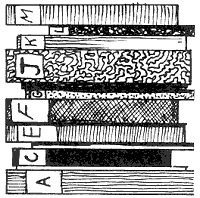
ANYONE who has used The Fast One, a filing system for the ZX-81, and has now upgraded to the Spectrum will be pleased to hear that Campbell Systems has a similar program, Masterfile, for the 48K Spectrum. The author describes the program as a business and domestic filing system which allows files to be SAVEd and LOADed independently of the program.
The program is menu-driven. Files are made up of records which can be designed in any way the user chooses. Each record can contain up to 26 items of up to 128 characters for each item.
There are several options which allow the user to manipulate a file or a record. They include searching by character or numeric value, updating or copying a record, totalling or averaging items, and erasing records.
If a user has special requirements the program can be tailored to suit through the User Basic option. The program is also open-ended. That means a Microdrive option can be written into it.
On average, there is 32K of memory space available for data storage. That makes the system ideal for business use so far as memory is concerned but for full advantage the program needs to be run with a mass storage device, such as the Microdrive, with fast access to large amounts of data.
Masterfile is available from Campbell Systems, Essex. It costs £15.
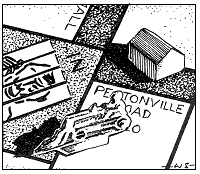
SOFTWARE HOUSE Work Force has produced three very entertaining games and one very helpful toolkit package for the 16K and 48K Spectrum.
Base Invaders is one of the most addictive space invader games we have reviewed. It is difficult to beat, unlike some other games we have received in the last few months. The authors have also included a shield for the laser bases at the bottom of the screen which can be activated if the going becomes difficult. High Noon is the best version of Shoot Out we have seen either for the ZX-81 or the Spectrum. The animation achieved as the two gunfighters try to shoot down each other among the cacti and the wagons is very smooth. The game can be played with a human opponent or with the computer. Both games are for the 16K or 48K Spectrum.
Do Not Pass Go is a version of that popular board game over which Waddingtons seems to have a Monopoly. The game is the same in most respects and the computer acts as the banker, debt collector and property broker. The computer will allow two to six players to try to find the road to riches - or rags as the case may be. Do Not Pass Go is for the 48K Spectrum.
The toolkit for the 16K and 48K Spectrum is called The Programmer's Dream. It will re-number programs, move blocks of lines to other parts of a program, erase one line or blocks of lines, change the values of strings in a program, list variable names and contents of a program, and display the size of a program and the amount of memory used to store variables.
The program is ideal for Basic program development work and works like a dream.
Base Invaders and High Noon are available for £4.50 each. Do Not Pass Go costs £6.95 and The Programmer's Dream £6.95. All can be obtained from Work Force, Beds.
MAKING MUSIC from the Spectrum BEEP command seemed almost impossible a short time ago but now PDQ Software has a package called Spectsound which will turn the computer into a mini electronic organ.
The package, for the 48K Spectrum, contains a cassette, an instruction booklet, and a keyboard overlay. The overlay shows the notes which can be generated; the keys to switch to an octave higher or lower; and operation keys to generate random notes; delete notes; change the duration of a note; delete the whole tune in memory and play the tune so far in memory. The sound from the Spectrum is not amplified in any way using the package but the introductory booklet provides the user with ideas how to increase the output.
It is possible to store tunes and to load them back into the Spectrum. It is also possible to display the numbers which correspond to the BEEP statements necessary to construct the tune in a separate program.
Spectsound is excellent value at £5.95. It can be obtained from PDQ Software, Kent.